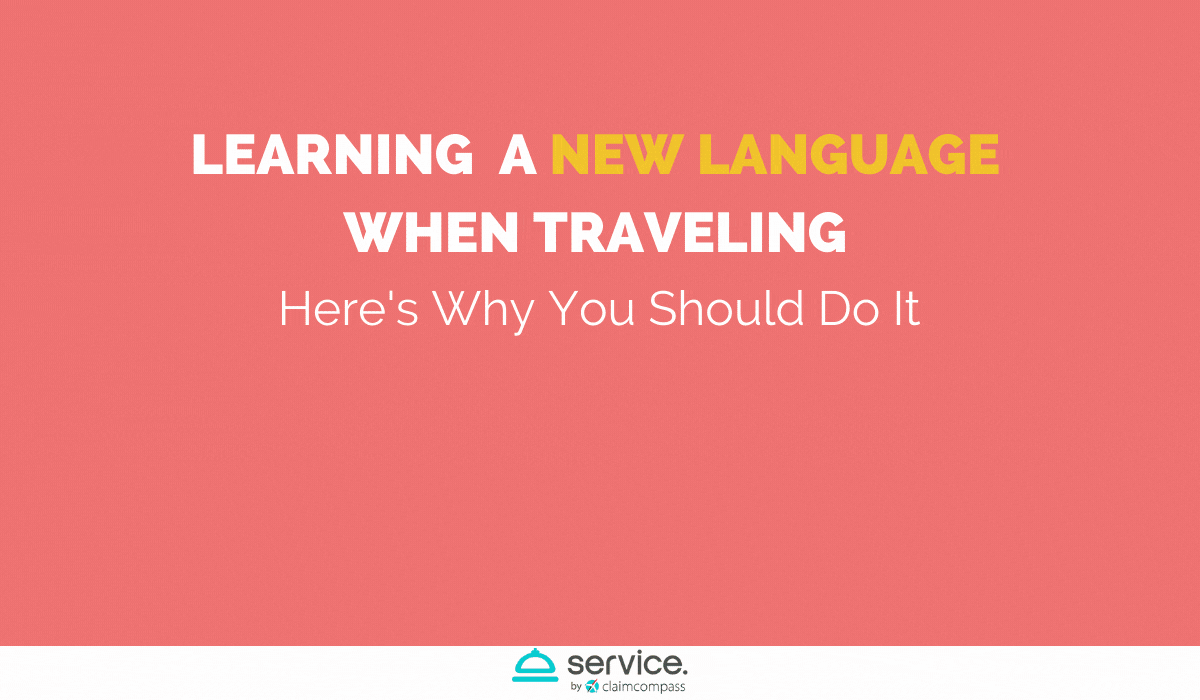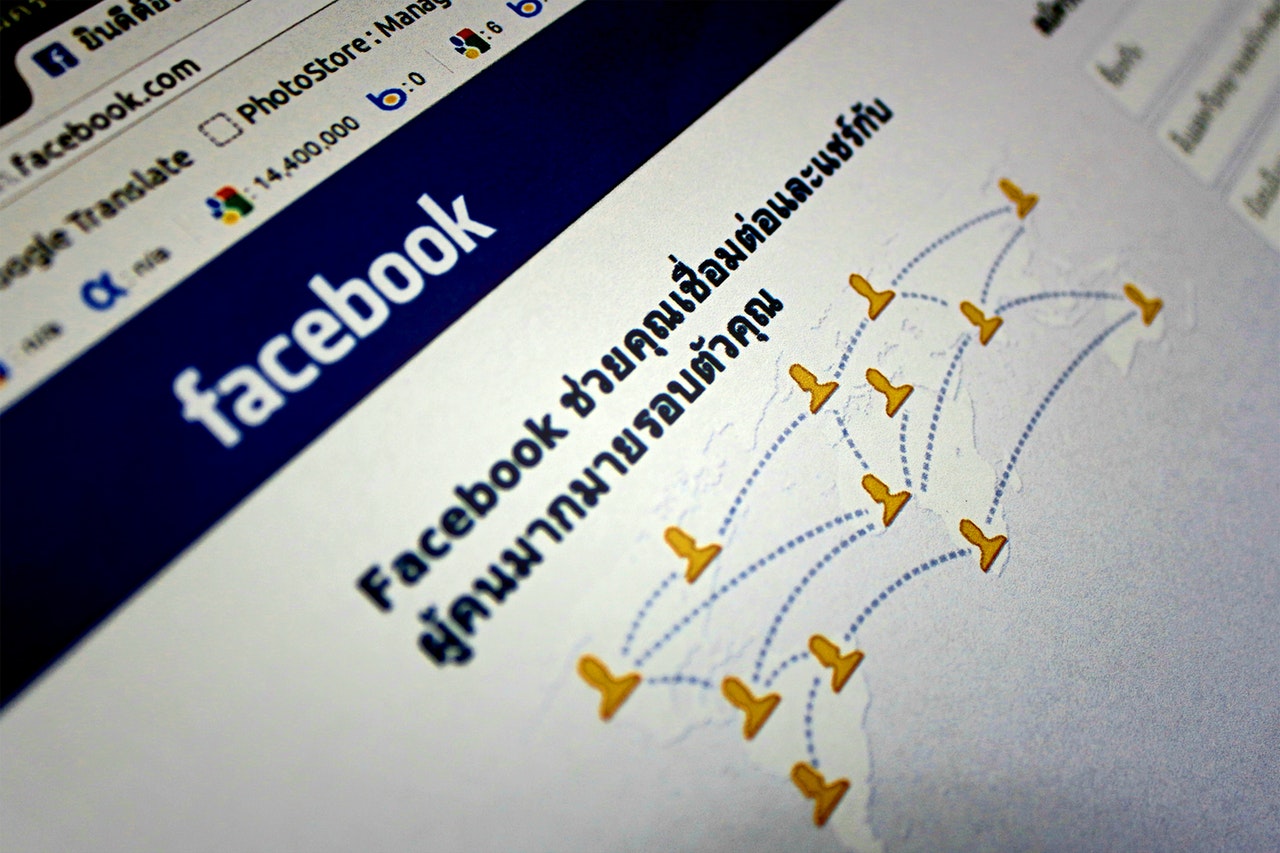You Should Learn a New Language When You Travel
Tips from experts to learn a new language fast, easy ways to remember the basics and benefits of making the effort to speak a new idiom: discover it all!

One of the main reasons why I became serious about learning a new language when I travel is that I hate standing there, smiling like an idiot.
These sad (and ridiculous) moments are systematically part of my worst memories when I travel to a country where I don't speak the language.
And I bet it happened to you too.
When you were at the market in Bulgaria and the seller was talking to you and smiling at the same time. You didn't get much (if anything) of her Bulgarian, but you smiled back because that's all you could do. That, and feeling stupid.
It didn't happen to you? Well, I guess I was that guy then...
Even if it didn't, I assure you: you want to keep it this way.
If for that reason only, you should learn a new language before traveling abroad.
It sure seems like a real hassle and it can be - but I can guarantee that the benefits outweigh the disadvantages. Unfortunately, there isn't a magic trick that will make you a polyglot overnight. But there are a few ways to make the process easier and quicker.
For those of you who already know the value of getting the hang of a new language, feel free to scroll down and skip directly to the tips that will help you grasp the basics of a new language faster!
The Benefits of Learning a Foreign Language
You won't look like an idiot

I told you this was my #1 reason for learning a new idiom. You wouldn't know about that feeling if you've only traveled within your country or somewhere where your language is widely spoken.
The closest thing would be if you were part of a group conversation where everyone was chatting about a topic you didn't know anything about. Imagine being at the restaurant with a bunch of surfers discussing the best ways to ride a wave. You're having a good time, the place is cozy, the food is good, it smells delicious, everyone is having fun...
Except you. You are that guy at the end of the table who's just smiling and nodding in agreement with everything that's being said but is incapable of actually taking part because he doesn't get anything.
This uncomfortable feeling is one you want to avoid and that should motivate you to learn at least the basics of the language of the country you're traveling to.
It's the doorway to better understanding a culture
Back when I was at school, I decided to study Latin. Just because the school was organizing a trip to Italy but only for those who studied Latin (which was stupid because believe it or not, they don't speak much of this idiom now in Italy).
Yes, it allowed me to go on a trip, but apart from that, I found Latin completely useless since no one spoke it anymore. But now, years later, I realize that studying Latin gave me the keys to understanding elements of the culture or history of Latin countries. My point isn't that you should learn Latin, don’t make that mistake.
But keep in mind that by learning a new language, you might get a better understanding of the people who speak it and their culture. For instance, you will learn what kind of food they eat or how the notion of respect is expressed.
That's how I learned that they are specific words to use when you address an elderly person in Turkish and that the Chinese have a lot of meals based on pork or chicken.
Tweet now: "Knowing the basics of a language truly helps you understanding a new culture."
Traveling becomes so much simpler

Whether it's for reading a sign or asking your way, you'll be glad that you spent some time learning directions in the language of the country you visit.
It might not seem like much but picture this: you're in the middle of nowhere, there's only a road with two directions and you can't read the sign. You don't want to spend a lot because you travel on a budget and don't want to waste time either, so you don't want to take a bus going the wrong way. If you can explain where you want to go or just understand the signs, you'll save yourself a lot of time and money.
The same goes with understanding the menu at the restaurant. Don't think that there will be an English menu everywhere you go or one with pictures. It becomes even more critical if you have a specific diet or are allergic to something!
As a rule of thumb, learning a new language helps you make the most of your trip to fully enjoy the benefits of traveling.
You'll get yourself out of trouble more easily
In some countries, when you don't speak the language, it's like there is "tourist" written on your forehead and merchants will automatically try to scam you.
When I was in Zanzibar, my Airbnb got canceled at the last minute and I had to find a place to stay (check out those Airbnb tips to know how to handle that). In many hotels and hostels, they were trying to rip me off. One of them actually made it official: he showed me the prices of their room written on a board that read "local price" and "tourist price"! As you might have guessed, the tourist price was way above the "locals" one.
By the way, if you don't have an Airbnb account yet, sign up through this link and you'll get 35€ in travel credit!
It's the same when you visit touristic areas or want to buy something. If you try to bargain in English, you're starting with a disadvantage.
In China, I was glad I got a bunch of fruits for half the price that the vendor asked for in the first place. But my local friend told me that it was still way above what he was paying for... By the end of my stay, I was able to haggle in Chinese and the retailers were more inclined to settle for a smaller price.
Meeting new people becomes a piece of cake

Knowing that you can understand the basics and babble a few words yourself is usually enough to boost your confidence abroad. And confidence is really all you need to go out and meet people.
The first couple of weeks I spent in Istanbul wasn't exactly perfect. Sure, the city was beautiful, the food was amazing... but I didn't have many people to talk to. I was surprised that so few people spoke English. When I was going out, I knew I would have to resort to an improvised sign language and smile stupidly again, which really wasn't a great incentive for me to leave the flat.
But as soon as I did the effort to learn the basics of Turkish, the new language opened the doors for me: I was able to ask the fruits that I wanted to buy from the merchants without pointing at them, understand their price, order at the restaurant, and so much more.
It becomes suddenly super easy to talk to the locals and have a better experience of your stay abroad. You wouldn't believe how proud it makes you feel when someone doesn't realize that you're a foreigner!
Very recently, I ordered my döner in Turkish in Berlin: the man was positively surprised that a Frenchman knew enough Turkish to understand his questions and reply in the same language. Addressing people in their own language will instantly win them over to your side.
It shows that you are open-minded
I'm sorry if you're one of them, but I don't really like pretentious people who believe that only their language matter, or that everyone should speak English anyway. And neither do the locals of the country you visit, usually.
Whether you want it or not, it's sometimes hard not to be branded as a tourist, because of the color of your skin, the shape of your eyes, your accent or whatever it is. You can't always change that. What you CAN do, however, is not be branded as a self-centered tourist.
And you won't, if you try to initiate the conversion in the local language. Even if you end up saying you don’t speak it, locals will appreciate the effort. And be happy about it.
Speaking a few words of a language that is foreign to you shows that you don't consider your trip as your holidays' destination only: it's a proof that you took at least some interest in the culture and the people.
Tweet now: "Speaking the basics of local language shows that you're not a self-centered tourist."
Your brain will thank you for it

Memory improvement is only one of the benefits that come with learning a new language, yet that one alone is a great incentive, isn't it? Picking up a new language stimulates some parts of your brain more intensively, making it more efficient. It's like working out: when you train your body regularly, it gets stronger.
It's no coincidence that children raised in a bilingual home usually have better cognitive abilities: their attention span is higher than the average, they are more perceptive and creative and usually perform better at school.
Learning a second language also reduces the risk of age-related cognitive decline. It means that your brain ages slower and you're at least postponing, if not eliminating, diseases like Alzheimer.
Plus, as incredible as it may seem, your brain will get bigger.
Tweet now: "Learning a new language makes your brain bigger."
Get a job abroad
If you're traveling abroad for a longer term, you might consider getting a job there. There may be a few multinationals' offices around, where you'd have your chances. But a sure way to improve the odds is to speak the local language.
Except if you're living as a digital nomad or are location-independent, learning the local language can only increase your chances of landing a job abroad. Even in a multinational outlet, chances are that most people working there are locals. English might be the privileged language of written communication, but the local language is usually the one spoken in the office.
The same goes for small jobs, which you might want to get to make money while traveling. They often require a minimum of interaction with other people, when it's not directly with customers. Demonstrating that you're good with the rudiments will greatly help!
10 Tips on How to Learn a New Language Fast
Know what you want right from the start

The way you will learn depends a lot on the level you want to have. Do you aim for fluency, the basics, or something in the middle?
Be honest with how much time you can dedicate to learning per day/week. Don't make it another New Year's resolution, promising yourself to study 1 hour every day if you're already giving up on week 2. Think of how much time you can spare every day and articulate this with your level objective to decide on a manageable schedule.
Settle for something that's achievable: being fluent in a month with only 30 minutes of study per day is going to be an impossible challenge. Knowing the basics is definitely possible, however.
Focus on one language only
I tried learning both Bulgarian and Turkish at the same time. My level for both languages was stagnating at "mediocre" for a long time.
Yes, learning several languages helps your brain, but two new (totally) different languages at once just make up for information overload. Just like multitasking, it's being sold as something great, but it's just counter-productive.
Study common words, those that you use the most

That's a tip from Benny of Fluent in 3 Months. The polyglot used to be bad at languages until he built a method to learn a new language fast.
An essential part of this system is to focus on the words that you use and will need the most. That's why he recommends learning how to introduce yourself: you do it all the time when you meet someone.
Make sure you also know how to say what you like and the activities you'd like to do. Being able to read a menu at the restaurant is an invaluable skill, especially if you have a particular diet!
I also mentioned how useful it is to learn the numbers. In many languages, there is a very logical pattern and it shouldn't take too long anyway. It also goes without saying that the basics of politeness are a must: "hello", "goodbye", "thank you", "please"...
Take some time to learn some handy one such as "I'm sorry, I don't speak...", "Where are the toilets, please?", "Can I have a beer?", "Can I have the check?", "How much does it cost?".
Learn whole phrases
If you don't have much time before you leave or can't dedicate much time to learning, that's what you want to do. Even more so if you don't plan on becoming fluent but simply want to get around with ease once you're abroad. Studying the grammar will just take too long and be a waste of your precious time.
Another tip from Benny the Irish polyglot in this regard is to get a guidebook, ignore most of it and only highlight the sentences that will be useful. Go straight to the essential.
He recommends the Omniglot phrase list, which I've used myself for Bulgarian and Turkish and found super useful, even once I was abroad.
Make sure that you don't simply read them: check how they are pronounced. Google Translate lets you do it, yet I'd rather recommend checking out Forvo: instead of hearing a robotic voice pronounce the words, you'll hear it from a native speaker.
Make the most of the time that is otherwise wasted

During your commute or whenever you're waiting, you don't have much to do apart from staring at nothing. Next time you're thinking of going through your Facebook feed or playing a game of Candy Crush or Clash Royale, dedicate a few minutes to learning the language you want instead.
If you feel like you're always busy, you never have any downtime, then make some time. Learning a language does require clearing some space in your schedule, even though you can take shortcuts and be effective in the way you learn.
Actually, you should go as far as scheduling learning sessions for yourself. Time is one of the things that are most precious (in general, but particularly when it comes to gaining language skills). I know how tempting and easy it is to say "but I don't have enough time". Yes, you do, all it takes is to make some.
I love using apps during these down times. My favorite one is Memrise: it works with flashcards that help you make associations between a new word and an image, therefore making it easier to remember. I discovered it through the writer of the bestseller The 4-hour workweek, Tim Ferris, about a year ago and have kept using it ever since.
Duolingo is also a very popular alternative for the most common languages and a good help to pick up basic vocab and learn sentence structure. Commit to a certain amount of time every day. Don't build your expectations too high though: no matter how much I like these apps, I doubt that you can learn a language only through them. That being said, they're a great way to improve vocabulary and keep everything you learn in mind.
Enroll in a course
The good old fashion way. It's probably the option that takes the most time, but it can be really effective if your teacher is a native. You can take classes after work or after class.
There are a lot of services online that can put you in touch with a teacher. I like the option of pairing with someone who wants to learn your language. This way, you teach them yours and in exchange, you learn their language. I did this in China, where I was texting a student in Chinese (no, it's not easy) and she was texting me back in French.
italki is a great service that lets you schedule 1-on-1 lesson with a native speaker. It's a perfect option if you need a personalized class and flexibility.
Change your phone and Facebook's language to the one you want to learn.

I'm not saying you should give up on Facebook altogether - but what about making the time you spend on it part of your learning experience? Polyglot YouTubers Damon and Jo change their phone and Facebook's language when they learn a new language and they speak at least 6 of them, so I guess it does help!
I bet that you already know by heart where to click to go where you want: you could change the settings to the language you're trying to learn. It'll help you learn some more vocabulary. It's this kind of (relative) language immersion that is the most effective because you don't even realize that you're learning!
Do the same for the games you play: you might even hear new phrases and expression in the process.
Do what you usually do... in the language you want to learn
Push this last advice even further! You like watching movies? Watch them with subtitles in the language you're learning! That's how I picked up on a bunch of useful Turkish words that people use everyday!
A positive side effect is that you’ll eventually see how better movies and series are in their original language. Here's how the polyglot Tim Ferris recommends that you proceed:
- Pick a movie that you know well and that you like
- Watch it in your language, with subtitles in whatever language you're trying to pick up
- Then, watch in the language you want to learn, with your native language as subtitles
- Finally, watch it with everything in the other language, even without subtitles if you can!
You can even skip the first step if you're confident.
Watch movies, series and YouTube videos, read books and blog posts, and listen to songs and podcasts in a foreign language. Do stuff that you would in your own language! It’s not really working if you like it, right?
Tweet now: "Watching a movie you like in another language is the best way to learn this language."
Make it fun

Making something fun is always a great way to learn and memorize. And what's funnier than remembering ridiculous sentences, curious expressions and curse words when learning a new language?
That's I think the best way to break the ice with people you don't know and make the others laugh. Usually, my new encounter with someone in Bulgaria would go something like this:
I say a few words, they understand that I'm a foreigner, I introduce myself (still in Bulgarian), they ask me what else I know. That's when I recite the few funny expressions and bad words I made sure to remember.
You're sure to make them laugh and to surprise them! Obviously, using them depends on the context: I wouldn't use them if I were invited to an event. Or would I...
Tweet now: "Knowing how to curse in another language is as important as knowing how to say "hello"."
Try to practice before you leave
Being able to practice with a native speaker lets you identify your weaknesses and correct them before getting to your destination. If you know someone, that's great. But there are always alternative ways to talk with a local.
Even if you don't want to pay for regular lessons, I'd still recommend you to book one class on italki before you leave. This way, you can ask your "teacher" to give you feedback on the way you introduce yourself, correct your grammar, maybe your accent as well. And, more importantly perhaps, you'll be able to hear what the language actually sounds like when spoken by a native speaker.
It's one thing to learn in books and apps, with automated voices - it's another to speak with an actual human being. If you don't want to discover this the hard way, make sure to have at least a trial round before setting foot in a foreign country. It gives you time to identify and improve your weaknesses in advance!
Do you need to be fluent to travel in a country where you don't speak the language?
You won't sound like a native speaker

Sorry to break it to you. No matter how hard you study, there's little chance that you will sound like a local. But you know what? It doesn't matter. It's ok to make mistakes and have a strong accent.
People are smart enough to understand that you're learning. They don't expect you to speak like a native. Just the fact that you know some words of the language will already be appreciated, I can guarantee.
Don't focus on your mistakes.
Last resort solutions
An app that is both great and a shame is Google Translate. Many tourists rely solely on it to exchange with locals and make themselves understood. I can easily see why: you can speak into the microphone in English and the app will translate what you said.
While I would find it a shame to neglect to learn a new language entirely because you think you can manage just with Google Translate, I can't deny how useful it is when you need help with a translation on the spot. The best part of it is that you can download an entire language on your phone and access translations offline.
Using the camera of your phone, you can also decipher a menu or signs in the street (expect some weird translations from time to time, though).
You will keep improving your language skills once you're traveling

Don't feel bad when someone corrects you: it only helps you learn. I think it's super important to learn a new language before you travel, and it's even more critical to keep learning when you're there. You will actually learn much faster once you're in the country, in immersion, surrounded by local.
Go to the local market, avoid touristic areas where you will instantly be spoken to in English, and listen to what people say: you'll quickly pick up the most used expressions. I wouldn't be surprised if you realized that what you learned in a guidebook is actually not what people say in real life! And that's why you will keep learning and improving your skills during your travel.
Final words on Learn a New Language When You Travel
Once you've booked your cheap flight tickets, get started learning a new languages!
It's an investment (mostly in time) now but it will undoubtedly have great rewards, during your trip but not only.
